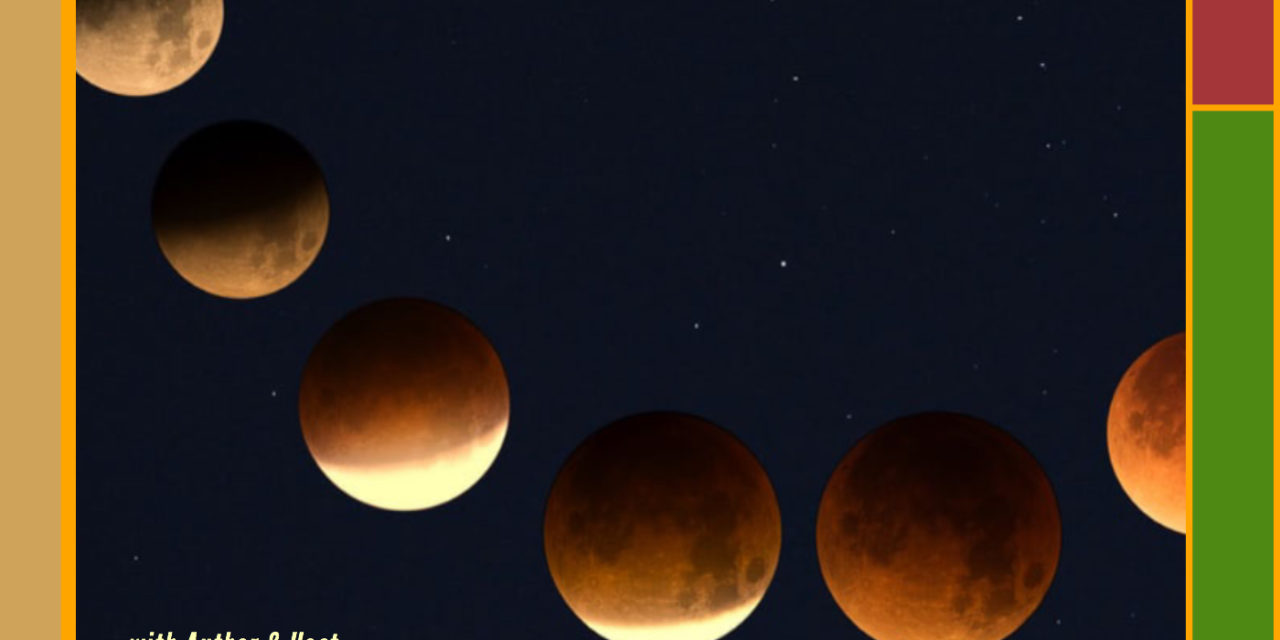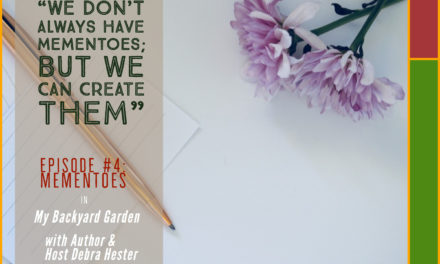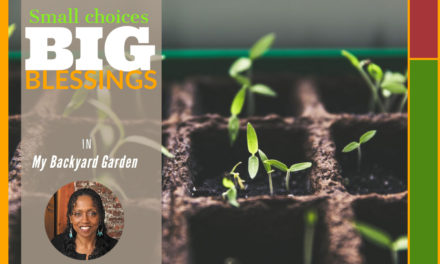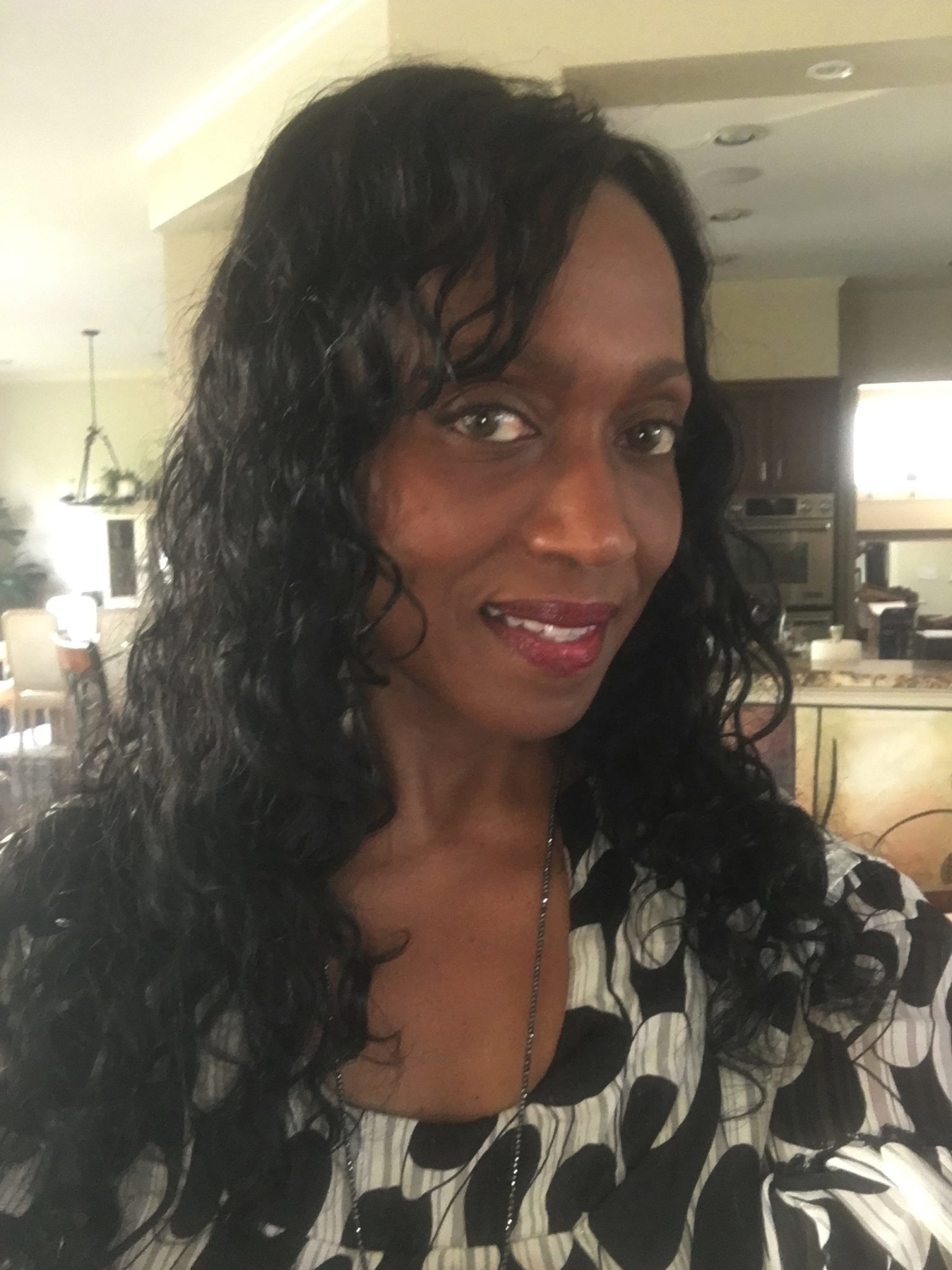Welcome to Mother’s Backyard Buzz E7
Here we are at episode number seven of #empathyforgrief podcast where we “break the silent struggle” around grief by unpacking my book: “My Backyard Garden – A Memoir of How Love Conquers Grief.” We’re taking our time, so I’m still unpacking the Introduction section of my book. If you have a copy of the book, I’m sure you’ve passed where we are. But the whole objective of the book and podcast is about life long learning, reflection, experience, and growth. I know I sound like your local learning professional, and I am. This is Debra Hester sharing my personal grief journey. I’m blessed to be the author and your host of #empathyforgrief podcast. Let’s get moving and delve into what I included and didn’t include in my book that speaks to this journey we all take called grief. Let’s talk about the five stages of grief.
Let’s Talk and Walk in Five Stages
Do you know the stages of grief? I had heard of them before my mother’s death. At that time, in my mind, they were just another model that was created from someone’s college research study. After my mother died, and I realized I was on this grief journey, I Googled them. That’s when I found out there are five stages of grief that explain the series of emotions a person can experience when they have lost a loved one. What I didn’t realize was that there are also seven stages of grief.
But I’m getting ahead of myself. Back to the five stages of grief. Just as a refresher, the five stages of grief are: denial, anger, bargaining, depression, and acceptance. They are all pretty straight forward in their meaning except for “bargaining.” So for the purpose of our topic today, how I’ve understood the bargaining stage is that it’s an attempt, please note the word “attempt” to negotiate pain away.
When I initially learned about these, if I wasn’t already in the anger stage of grief, I automatically went there, to the anger stage. I though how dare someone tell me how I’m going to progress through the grief process and come to acceptance. And who says, “I’m angry now and depressed later versus just always depressed. I tell you when I very first looked at this as a resource, I felt helpless. I ignored this entire concept and model because I wasn’t following this. This wasn’t what and especially how I was feeling. The stages were not tracking with me.
I thought that no one was going to be able to help me. Especially if the stages of grief were the best the information age had to offer: just five, looking like a shortlist to me, stages of grief.
Seven Stages Forward And Five Steps Back
So now, let’s move to the seven “emotional” stages of grief. And I think it would be helpful to remember and include in the label “emotional” stages of grief. They start with shock or disbelief. Next comes the same as before: denial and bargaining. We add “guild” and continue with anger, depression, and “hope” as a Part of “acceptance”: “hope/acceptance” as the final seven emotional stages of grief. Now, if we count all th terms separately, I would count nine emotions. I definitely went through both the “shock” and “disbelief” stages. And , it wasn’t an “either/or” moment; but a both of these emotions.
I know its’ only a framework, but I can’t believe I’m the only person who saw this resource and shock my head in disbelief. So I’m all about breaking the silent struggle around grief and trying to tell you that what you’re feeling is normal and you’re not alone. So, if you’re not tracking or seeing your journey in the stages of grief, you’re not alone. It’s O.K.
A Grief Journey That’s Human
After I experience the death of my mother, I looked at grief differently. What I’m most afraid of is that many people who haven’t truly experienced a grief journey may think that these stages are all there is to grief. These emotions, these stages of grief define how we, the grieving, are feeling and will feel. I know it’s an attempt. I want to be clear to my listeners that it is just that: “an attempt” because I am still writing about my grief journey and I’m closer to “words can not explain how I feel.”
I’ve found that many things come back again as you move through your grief journey. When the stages of grief returned to my thoughts, I began to wonder and ask myself, are they “stages” or responses to the pain of loosing a loved one? For one, stages made me feel like they were sequential or steps and I had some type of order, like they were placed. There is not specific order, I was so all over the place emotionally. I realized that I don’t care for the word stages either. A picture of me on a revolving stage came to my mind. I don’t mean to be trite, but let’s be real, they are emotional responses. We are human, we have emotional reactions to things.
A stage makes it feel like there is some defined period, and then you move on. Not. And most of the emotions seem not very positive, and that was not always true. At times during my grief journey, there was joy, that wasn’t about acceptance. There was regret sometimes and , at other times, even a feeling of accomplishment when I found everything that would be my mother’s burial outfit. In my MOVE Mapping for Grief Workshop, we spend time talking about exploring this concept to explore and broaden our perspectives on the many unnamed human responses to grief.
Numbers Cannot Define But We Can
Now that we’ve discussed the limits of the stages of loss, I hope we recognize that there are potentially many emotional responses. So the question is: Can you use this framework as a way to begin to identify what you are feeling your loved one who is going through this grief journey might be feeling? Like most of my podcasts, it’s a discussion that reflects on my personal grief journey. However, I share because I was hoping we could think more and differently about these preliminary stages of grief. Or you know how I like to think of them as: “emotional responses” to the loss of a loved one.
So I ask you, what emotional responses have you, or are you going through? Write them down, think about them. What triggers them? How long do they last? Look into how professional counselors or psychologists define them. Ask others that are close to you if they see these emotional responses in you. Then own them, recognize that they are not who you are but what you’re going through right now.
If you’re watching a loved one who is grieving and going through these emotions, it’s helpful to realize what they are going through and hopefully not becoming. However, have the patience for them. Remember they’re going through a period that is not defined. Show empathy and ask them if you can help in any way.
I hope you reflect and have an ah-ha moment. When I have mentioned this to others, they often say, I hadn’t thought about that the change I’ve been seeing because they lost a loved one. So loved ones, I’d like you to watch for these emotional responses that don’t seem like the normal you. Write them down, take a note, reflect and talk to someone about how you feel. If you wake up and just feel off, stop, find your place, reflect to see if the root maybe your grief, and then try and use some of the other suggestions that I’ve made in previous podcasts.
I hope this podcast can help you identify or at least look for these emotions in yourself and others. Remember long after the funeral, any of these emotional responses can appear. And when they do, it’s an excellent time to show #empathyforgrief towards others and yourself. If you see something different in the person who is grieving, ask them how you can help, if they need to talk it out, if they’d like to share why the sudden change in emotions. Be there for them, be there with them, try and see how you can help them move forward when grief strikes.
Grief is Not Just Emotional
I want to leave you with one final thought about the stages of grief. These stages are only emotional responses to the loss or death of a loved one. There are behavioral responses, for example, “I can’t sleep.” There are also physical responses to grief, for example, “I feel sick to the stomach” or “I have aches and pains. They are real too, I am just not addressing those in this podcast. I do share them in my book because I went through them, and I will likely discuss those other behavioral and physical responses to grief at that time. Remember, we are on this grief journey together. We want to move forward and show more empathy than sympathy along the way.
Now and Next
I want to thank you loved ones for listening to Mother’s backyard Buzz podcast: #empathforgrief – Break the Silent Struggle With Grief. This is Debra Hester, your host, where I pledge to continue to break the silent struggle with grief. Remember: move forward from grief with love and more empathy, less sympathy. If you found the podcast helpful, please subscribe to me on Spotify, Apple, iHeart and other podcast providers. Find out more about Mother’s Backyard mission, at www.mothersbackyard.com. You can follow me on Twitter @mbackyardgarden and on Facebook and Instagram at Mothersbackyard. Join me next week when we talk about “Extensions,” did you know grief has roots? Peace and Blessings.
Like Us on Facebook: MBackyardGarden






